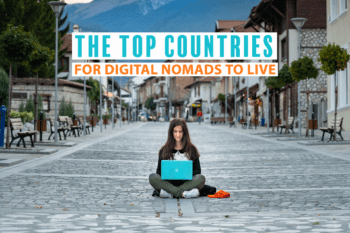
Remote work has only continued to gain popularity since the COVID-19 pandemic. You get to earn a living while working from the comfort of your own home — or better yet, while traveling the world! With nomad living becoming more common, there are a few things to consider when selecting the best countries for digital nomads. You must think about the practical aspects of remote work from various locations, such as internet connectivity and visa restrictions. Choosing the right country to kick off your nomad life is a key part of making sure you have a good experience.

Remote work has only continued to gain popularity since the COVID-19 pandemic. You get to earn a living while working from the comfort of your own home — or better yet, while traveling the world! With nomad living becoming more common, there are a few things to consider when selecting the best countries for digital nomads. You must think about the practical aspects of remote work from various locations, such as internet connectivity and visa restrictions. Choosing the right country to kick off your nomad life is a key part of making sure you have a good experience.
Where is The Most Popular Destination for Digital Nomads?
With so many countries now offering remote work visas, you’ll need to decide which one best meets your needs. The Italy digital nomad visa, for example, didn’t make our list because it is only available for highly skilled workers with a Master's degree. The digital nomad visa in Thailand is very popular, but it’s difficult to be approved and requires a minimum income of $80,000 per year. Just because a country isn’t on our list, doesn’t mean it won’t be an excellent place to make your next home base.

Find the Best International Medical Insurance
- Compare multiple quotes and coverage options
- Work with an insurance expert at no additional cost
- Find the best plan for your needs and budget
But First — What are Digital Nomads?
Digital nomads are people who are location-independent and work remotely from their laptops while traveling the world. Whether they are in a hotel, in a cafe, on their bed or on the beach, they can do their assignments as long as they can connect to the internet.
The term was first coined by Tsugio Makimoto and David Manners in 1997. The concept has only continued to grow in popularity since then. The recent COVID-19 pandemic further opened up many people's eyes to the possibility of remote work. During lockdowns, many businesses adopted work-from-home setups to reduce the spread of disease while still keeping their companies open. These policies contributed to the growing global nomad trend. This shift has continued post-pandemic, with more people than ever before expressing a desire to work remotely.
In 2018, around 4.8 million Americans identified themselves as digital nomads. In just five years, this number grew to 17.3 million — that’s 11% of all U.S. workers! Globally, nomad numbers are expected to top 40 million in 2023 and continue to rise to about 60 million by 2030.
Nomad living offers freedom and flexibility. You don’t need to sit through daily traffic to get to work. Depending on the job, you might not even be tied to the traditional 9 to 5 work hours. You can explore the world while still earning a living.
How To Become A Digital Nomad
Becoming a global nomad means finding a job that allows you to work remotely. The first thing you need to do is assess your skills and figure out how you can make money online. Consider signing up for classes to expand your skill set if needed. The majority of digital nomads work in information technology (IT) or creative industries. The second most popular industries are training, sales and marketing.
If you’re employed, ask your company about the possibility of moving to full-time remote work. Unfortunately, many companies have restrictions due to tax liabilities and time zones. But, that’s changing! Look for new jobs that mention “distributed teams” or “asynchronous communications.” You can also consider becoming a freelancer or opening your own online business.
Once you know how you’ll be making money online, you’ll need to figure out the logistics of working remotely. You should build a portable workspace that you can carry with you wherever you go. Think about what tools you’ll need for digital collaborations. Consider how you want to manage your money. It might be a good idea to consult or hire an accountant who specializes in global citizens.
Most importantly, remember to be flexible and stay up to date on visa restrictions and travel advisories.

How to Choose the Best Places To Work As A Digital Nomad
There are many factors to consider when selecting where to work as a global nomad. How safe is the country? What is the culture like? Are locals accepting of foreigners? What is the weather like? What sort of activities are available? What is the time difference to my home country?
Also read: Best Countries to Live In for Foreigners
Many things are based on personal preferences depending on the types of experiences you want to have and the types of environments you work best in. But out of all the different things to think about, remote workers tend to agree on the three most important factors when deciding where to work:
These are the first things that global nomads often look into before contemplating their personal preferences. These factors dictate how easy it will be to maintain the lifestyle of a digital nomad in a given area.

In Pursuit of Fast Wifi
Having a fast and consistent internet connection is a must for the global nomad. Working remotely will highly depend on how reliable the internet connection is in the area. People log on from all sorts of places — libraries, cafés, parks or even cars!
We looked at both the average broadband and average mobile speeds to determine the countries with the fastest internet. The type of internet you need will largely depend on the type of work you do and where you do it from. To build the list, we gave 60% weight to broadband speeds and 40% weight to mobile speeds.
As of December 2023, here are the countries with the fastest internet speeds:
| Country | Broadband | Mobile |
| United Arab Emirates | 235.72 Mbps | 269.4 Mbps |
| China | 230.3975 Mbps | 164.14 Mbps |
| Denmark | 206.8 Mbps | 143.63 Mbps |
| Kuwait | 153.58 Mbps | 191.74 Mbps |
| The United States | 215.72 Mbps | 103.69 Mbps |
| Iceland | 204.80 Mbps | 139.52 Mbps |
| Singapore | 264.1593 Mbps | 89.45 Mbps |
| Macau (SAR) | 160.52 Mbps | 155.75 Mbps |
| Switzerland | 187.48 Mbps | 89.45 Mbps |
| Qatar | 127.04 Mbps | 206.80 Mbps |
While not everyone who works remotely needs blazing-fast internet speeds, most want to at least have an uninterrupted connection to finish their work. While internet connectivity continues to improve around the world, there can still be issues. Generally speaking, you’ll find stronger and more reliable internet in cities than in rural areas. When booking your accommodation, it’s a good idea to ask about the internet in the area and even request a screenshot of a Mbps speedtest if possible.
Living on a Budget
Many people think only those who are well off can afford to be digital nomads. The freedom of indulging in travel and exploring new countries does come with a price tag. Yet contrary to popular belief, a high paying job is not mandatory to be location-independent.
A lot of nomads simply build their travel around their budgets. The day-to-day cost of living, such as rent, utilities and food, are all things to consider when deciding which country you want to explore.
Using figures from Numbeo, we’ve ranked popular countries for remote workers based on the country’s cost of living. You’ll find that the most economical countries for nomad living are in South America and Asia:
|
|

What Is a Digital Nomad Visa?
Many remote workers take advantage of tourist visas to work and travel. These visas are typically offered for 30 to 90 days, depending on the county and your passport. However, working in a foreign country without the correct visa is technically illegal.
Fortunately, many countries are taking the emerging popularity of nomad life into consideration. Digital nomad visas are becoming available around the world. These remote work visas allow people to stay in a country for an extended period of time with the clear intention to work remotely.
Top Ten Countries With Digital Nomad Visas
With over 50 countries now offering different types of nomad visas, it can be tricky to determine the best countries for digital nomads. There are a few things you’ll want to consider. What is the length of the visa? How easy is it to apply and be approved? What are the monetary requirements? Will you have to pay taxes? Will you need proof of health insurance?
We used all the questions above to build our list of the best places for remote workers:
|
|
These visas vary in length, how long it takes to get them, and the requirements to apply. You’ll want to carefully look into each country and see if their remote work visa fits your timeline and budget.
Honorable Mentions for Nomad Visas
- Croatia
- Malta
- Ecuador
- Romania
- Indonesia
Do Not Skip the Insurance
Being location-independent is a great way to see the world. Keep in mind that the nomad lifestyle is not without its risks. The varying landscapes, activities and flights can expose you to different hazards.

Find the Best International Medical Insurance
- Compare multiple quotes and coverage options
- Work with an insurance expert at no additional cost
- Find the best plan for your needs and budget
It’s a good idea to make sure you’re covered for whatever may happen and wherever you are in the world. The last thing you want is to be worrying about money when faced with an emergency abroad. When choosing the best countries to work remotely, don’t forget about the insurance! Depending on your needs, you may want travel medical insurance, trip cancellation, or a longer-term international health plan. Take a look at our guide to global insurance for digital nomads to see what’s best for you.
More to Read:



